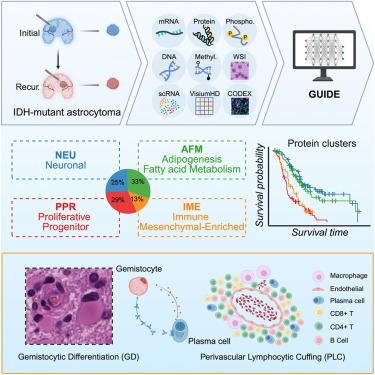Protein-based classification reveals an immune-hot subtype in IDH mutant astrocytoma with worse prognosis
IF 44.5
1区 医学
Q1 CELL BIOLOGY
引用次数: 0
Abstract
Intertumoral heterogeneity complicates treatment of IDH-mutant astrocytoma. We analyze spatiotemporal multi-omics data and discover four clusters: adipogenesis/fatty-acid-metabolism (AFM), proliferative/progenitor (PPR), immune/mesenchymal-enriched (IME), and neuronal (NEU). PPR and IME are associated with poorer prognosis, a result validated in The Cancer Genome Atlas (TCGA) and a Chinese cohort of 273 IDH-mutant astrocytomas. Longitudinal analysis of 189 initial-recurrent pairs shows an evolutionary shift toward PPR/IME subtypes. Mechanistically, PPR is enriched for CDKN2A/B deletions, whereas IME features increased gemistocytic differentiation (GD) and infiltration by exhausted T cells and plasma cells. Spatial multi-omics link GD morphology to mesenchymal-like (MES-like) tumor cell aggregates and lymphocyte-rich niches. MES-like tumor cells in IME overexpress interferon-stimulated genes such as GBP1, which we show promotes proliferation and migration. Finally, we develop an AI-powered classifier for patient stratification. Our work delineates protein-based clustering of IDH-mutant astrocytoma and reveals an immune-hot subgroup that may inform therapeutic development.

基于蛋白质的分类揭示了IDH突变型星形细胞瘤的免疫热亚型,预后较差
肿瘤间异质性使idh突变星形细胞瘤的治疗复杂化。我们分析了时空多组学数据,发现了四个集群:脂肪生成/脂肪酸代谢(AFM)、增殖/祖细胞(PPR)、免疫/间充质富集(IME)和神经元(NEU)。PPR和IME与较差的预后相关,这一结果在癌症基因组图谱(TCGA)和273例idh突变星形细胞瘤的中国队列中得到了验证。对189对初始复发基因对的纵向分析显示了向PPR/IME亚型的进化转变。从机制上讲,PPR富集CDKN2A/B缺失,而IME则增加了生殖细胞分化(GD)和耗竭的T细胞和浆细胞的浸润。空间多组学将GD形态与间充质样(mes样)肿瘤细胞聚集和富含淋巴细胞的生态位联系起来。IME中的mes样肿瘤细胞过表达干扰素刺激基因,如GBP1,我们发现它促进了增殖和迁移。最后,我们开发了一个用于患者分层的人工智能分类器。我们的工作描述了idh突变星形细胞瘤的基于蛋白质的聚类,并揭示了一个免疫热亚群,可能为治疗发展提供信息。
本文章由计算机程序翻译,如有差异,请以英文原文为准。
求助全文
约1分钟内获得全文
求助全文
来源期刊

Cancer Cell
医学-肿瘤学
CiteScore
55.20
自引率
1.20%
发文量
179
审稿时长
4-8 weeks
期刊介绍:
Cancer Cell is a journal that focuses on promoting major advances in cancer research and oncology. The primary criteria for considering manuscripts are as follows:
Major advances: Manuscripts should provide significant advancements in answering important questions related to naturally occurring cancers.
Translational research: The journal welcomes translational research, which involves the application of basic scientific findings to human health and clinical practice.
Clinical investigations: Cancer Cell is interested in publishing clinical investigations that contribute to establishing new paradigms in the treatment, diagnosis, or prevention of cancers.
Insights into cancer biology: The journal values clinical investigations that provide important insights into cancer biology beyond what has been revealed by preclinical studies.
Mechanism-based proof-of-principle studies: Cancer Cell encourages the publication of mechanism-based proof-of-principle clinical studies, which demonstrate the feasibility of a specific therapeutic approach or diagnostic test.
 求助内容:
求助内容: 应助结果提醒方式:
应助结果提醒方式:


